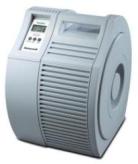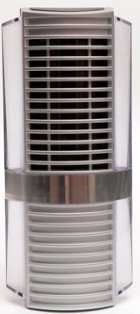Find a Mold Specialist Now
Click or Call, Toll-Free 24/7
Do Ionic Air Purifiers Work?
People often ask us do ionic air purifiers work. It’s a good question. It can be confusing trying to determine if an air ionizer purifier is best for your needs or if another type of air purifier would be better. We’ll tell you about the pros and cons of ionic air purifiers, but first let’s start with the basics.
How Do They Work?
An ionic air purifier, sometimes referred to as an ionizer, ion generator or ozone generator, emits electrically charged molecules called ions into the air. These charged ions attach themselves to particles of dust, mold, pollen, pet dander and other allergens and irritants in the air. That charges the particles so that they will attach to each other, making them larger and heavier so they settle faster. It also makes them cling more to surfaces like walls, floors and furniture. Then there are fewer particles drifting around in the air that can be inhaled.
When looking at how do ionic air purifiers work, it’s important to understand that an air ionizer purifier does not actually capture particles or eliminate them from the home. Particles of mold that have been charged by ions can still grow and spread, and the particles that cling to various household surfaces can be stirred up again by activities like vacuuming, dusting or other common household activities.
Now that you understand how ionic air purifiers work, let’s look at the advantages and disadvantages of this type of air purifier.
Advantages of an Air Ionizer Purifier
Many models are less costly than some other types of air purifiers, although the cost for any type of air purifier varies depending on the model you select. They are typically compact and easily moved from one room to another; some are very small and actually designed for cars. They are easy to care for and have no filters to be cleaned or replaced periodically.
Disadvantages of an Air Ionizer Purifier
According to the Environmental Protection Agency, air ionizer purifiers are usually better at charging small particles in the air than larger particles. Since people often have particles of various sizes polluting their indoor air, this can present a problem. In addition, they produce small amounts of ozone, which is actually a lung irritant and also detrimental to the environment. While some people with respiratory conditions may find their conditions improve with use of an ionic air purifier, some may actually develop additional breathing problems.
How Well Do Ionic Air Purifiers Work? The Bottom Line:
According to the Environmental Protection Agency, there is no standard way to measure the effectiveness of an air ionizer purifier, since it does not capture and collect particles the way mechanical air filters do. Therefore, there is really no way to know how well they work. The bottom line, for us, is that we want something we know is going to be effective.

Alternatives to Ionic Air Purifiers
When asked do ionic air purifiers work better than the alternatives, we have concluded that they do not. While there are a few different alternatives from which to choose, we recommend a mechanical air purifier with a HEPA (high energy particulate air) filter from Honeywell. Those made by Honeywell have been determined to capture and remove at least 99.7 percent of all particles, large and small, from indoor air. The HEPA filter is especially recommended if you have mold or other potentially hazardous substances in the home. The Honeywell air purifiers also contain activated carbon prefilters that help remove odors from the air.
You can follow this link to Amazon.com to view all of the Honeywell Air Purifier Models. Besides having the lowest prices, we found their customer reviews very helpful when selecting the right model for your needs.
Return From Do Ionic Air Purifiers Work To Air Purifiers for the Home
Black Mold Health Symptoms Home Page




